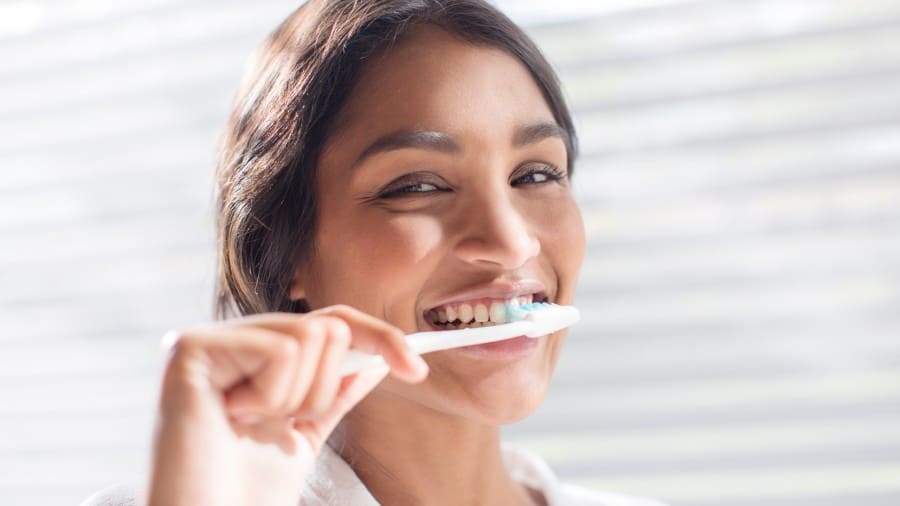The Natural Power of Mint
Mint (scientifically, genus mentha) is a flowering plant that is easy to grow and spreads vigorously in your garden. The mint family includes several species and their variants. Mint contains menthol, a natural substance that refreshes your breath. It stimulates the nervous system, creating a cooling sensation. The uses of mint extend beyond cooking to include wellness and dental health.
Mint offers several health benefits. It fights germs, reduces swellings, and combats cell damage and various systemic disorders. Many personal care products, such as lotions and balms, include mint to help soothe discomforts. Mint supports oral health by masking bad breath, fighting germs, and stimulating saliva flow. It is often used in chewing gums, toothpaste, and mouthwashes. Including mint in daily oral care and diet helps boost oral hygiene and overall health.
Mint And Oral Health
When it comes to oral health, mint is a natural solution to combat bad breath and keep your teeth and gums healthy. Its antibacterial properties help fight germs that cause plaque buildup and gum infections. Mint also has calming properties, which soothe irritated gums. Understanding the mint uses and benefits for oral health helps you make mindful choices of oral care staples for a healthier and cleaner mouth.
Proprietary mouth rinses and toothpaste containing mint are available across stores. For instance, you may try using the Colgate MaxFresh Peppermint Ice Toothpaste. Its unique cooling crystals offer instant and lasting freshness. Its peppermint extracts cleanse your teeth and gums and prevent cavities, bad breath, and gum problems.
Freshens Breath Naturally
You may be familiar with the benefits of eating mint leaves to freshen your breath. The menthol in mint leaves and essential oils is responsible for mint’s characteristic aroma, cooling sensation, and breath-freshening ability. When you chew mint leaves, menthol works by masking the unpleasant odour and creating a sense of clean and fresh mouth instantly. It also stimulates the flow of saliva that washes away harmful germs that promote bad breath.
Fights Oral Bacteria
Mint benefits oral health by fighting germs that cause plaque buildup, gum disease, tooth decay, and bad breath. It includes compounds, such as rosmarinic acid, with natural antibacterial properties. They reduce and slow down bacterial growth, promoting a cleaner and healthier mouth. Mint boosts saliva production, which is vital for a healthy oral environment. Saliva washes off food debris and bacteria and helps remineralise teeth to combat acid attacks. Using oral care products with mint helps prevent dental problems and supports oral health during pregnancy.
Reduces Inflammation in Gums
Like chamomile and green tea, mint tea is used by many to ease the discomfort of swollen and irritated gums. The medicinal benefits of mint for the gums emerge from its anti-inflammatory and antibacterial properties. Gum infection and irritation often occur from plaque and tartar buildup that house harmful bacteria. Using mint toothpaste or mouthwash not only reduces swelling and soothes the gums but also inhibits bacteria. Hence, oral care products with mint are an ideal choice to combat potential gum problems and improve gum health.
Relieves Tooth Pain
Tooth pain occurs from cavities or other causes, which are best diagnosed and treated by a dentist. However, using extracts of mint leaves for teeth temporarily relieves the pain until your dental appointment. Dipping a cotton ball in peppermint oil and placing it in the affected area is considered useful by many. As a natural analgesic, it offers pain relief with a cooling sensation that numbs the nerves. Besides, the antimicrobial properties inhibit germs in the affected area and support healing.
Benefits of Mint on Overall Health
The benefits of mint leaves make them a valuable addition to the daily routine. Beyond adding aroma and flavour to the food, mint offers essential nutrients that your body needs. It is also a powerful antioxidant that helps resist damage to the cells caused by oxidative stress. Besides supporting your dental health, mint benefits your stomach, immune system, brain function, and overall wellness.
Supports Digestion
You may be familiar with the benefits of eating mint leaves at the end of a meal. It aids digestion and soothes discomfort in the stomach. Many use it to ease nausea, stomach pain, diarrhoea, and an upset stomach. Mint helps reduce bloating and indigestion by relaxing the muscles to let the food pass easily through the digestive system. Hence, many consider using it to soothe IBS symptoms (irritable bowel syndrome) as well as the cramps of the upper gastrointestinal tract (GIT). However, those with GERD (gastroesophageal reflux disease) should consult a healthcare professional to avoid the possible side effects of peppermint oil when taken orally.
Boosts Immunity
Mint is not only a powerful antioxidant but also contains nutrients like calcium, iron, vitamin A, and vitamin C. The antioxidants help boost your immunity by reducing cell damage from oxidation. They help reduce inflammation and improve your body’s natural defence mechanism. Vitamins are essential for a strong immune system. They not only enhance skin health but also promote white blood cells that fight off infections to make your body resistant to diseases.
Relieves Stress And Improves Mental Clarity
The health benefits of mint find their application in aromatherapy as well. Mint features a refreshing aroma of menthol. It calms your nervous system, helping relieve stress, fatigue, and anxiety. The aroma of mint oil boosts alertness and helps you focus better. Studies note that the scent of peppermint essential oil helps boost learning and memory ability. It also protects brain tissues from damage due to oxidative stress.
Improves Respiratory Health
Mint benefits your respiratory health in multiple ways. Peppermint oil is often used to manage common cold symptoms, sinus infections, and cough. Menthol is widely used in cough syrups, nasal sprays, and inhalers to treat respiratory problems. It reduces congestion in the nasal passage and helps you breathe easily. Menthol also soothes the throat and provides relief from irritation and cough. It is often inhaled through steam, consumed as tea, or used in essential oils to clear the respiratory tract.
Ways to Incorporate Mint Into Your Routine
Mint is a kitchen staple common to Indian households. Knowing mint uses and benefits for oral and overall health lets you explore different ways to add it to your diet and lifestyle. Mint leaves and essential oils are often used to prepare delicious cuisines and refreshing beverages. You may use mint supplements as recommended by a healthcare professional. Mint-based oral care products are also available.
Using Mint-Based Oral Care Products
Mint-based proprietary oral care products let you enjoy their oral health benefits from the comfort of your home. Brushing twice daily using mint toothpaste cleanses your mouth and refreshes your breath with a cooling sensation. Mint leaf dental rinses or mouthwashes offer instant freshness and antibacterial action. These products effectively inhibit harmful bacteria, helping control plaque, cavities, bad breath, and gum diseases. They promote a healthy oral environment by stimulating saliva flow.
Fresh Mint for Health
Including mint leaves or essential oils in your diet is a simple way to enjoy the health benefits of mint. Besides adding flavour and aroma, mint enriches your food with properties that boost your overall wellness. Fresh mint leaves are often used in chutneys, salads, and smoothies. You may also use them to garnish desserts and soups. Mint aids digestion and supplies essential nutrients and antioxidants. Herbal tea using mint, such as peppermint tea, is a soothing drink that helps reduce stress and discomfort in the stomach.
To conclude, mint is a versatile herb that works beyond offering flavour and aroma. Mint benefits for oral and overall health make it an important addition to your lifestyle and oral care routine. Mint-based oral care products offer fresher breath and a healthier mouth that is resistant to oral problems. You may enjoy mint’s benefits for digestive health and overall wellness by adding it to your diet. Consult a healthcare professional for the best suggestions based on your health conditions.
Frequently Asked Questions
1. Is mint good for your teeth?
Yes, mint is good for your dental health. It has antibacterial properties that inhibit harmful bacteria which cause plaque buildup, bad breath, and gum infections. Mint also stimulates the flow of saliva that helps remineralise the teeth to combat acid attacks and tooth decay. The instant cooling sensation of mint offers freshness and helps mask bad breath.
2. Does mint make your teeth whiter?
While mint itself does not whiten the teeth, it supports a cleaner and healthier mouth, which adds brightness to your smile. Mint helps inhibit harmful bacteria that cause plaque buildup and boosts saliva flow to wash away food debris and surface stains. Though mint-based oral care products promote a healthier mouth, you may opt for whitening products or treatments for actual teeth whitening.
3. Is mint tea ok for teeth?
Yes, mint tea without added sugars or sweeteners is generally safe for teeth. Mint inhibits harmful bacteria in the mouth and refreshes your breath naturally. However, it is best to use it in moderation and consult a healthcare professional for proper guidance based on your unique health conditions.
4. Can we drink mint water daily?
Drinking mint water daily is generally safe and beneficial for many. Mint offers a refreshing, cooling sensation and has a soothing effect. It helps digestion and soothes discomfort in the stomach. Its nutrients and antioxidants support immunity and overall wellness. Moderation is the key. Ideally, consult a healthcare professional for guidance if you have health conditions like heartburn or GERD.
This article is intended to promote understanding of and knowledge about general oral health topics. It is not intended to be a substitute for professional advice, diagnosis or treatment. Always seek the advice of your dentist or other qualified healthcare provider with any questions you may have regarding a medical condition or treatment.
ORAL HEALTH QUIZ
What's behind your smile?
Take our Oral Health assessment to get the most from your oral care routine
ORAL HEALTH QUIZ
What's behind your smile?
Take our Oral Health assessment to get the most from your oral care routine













